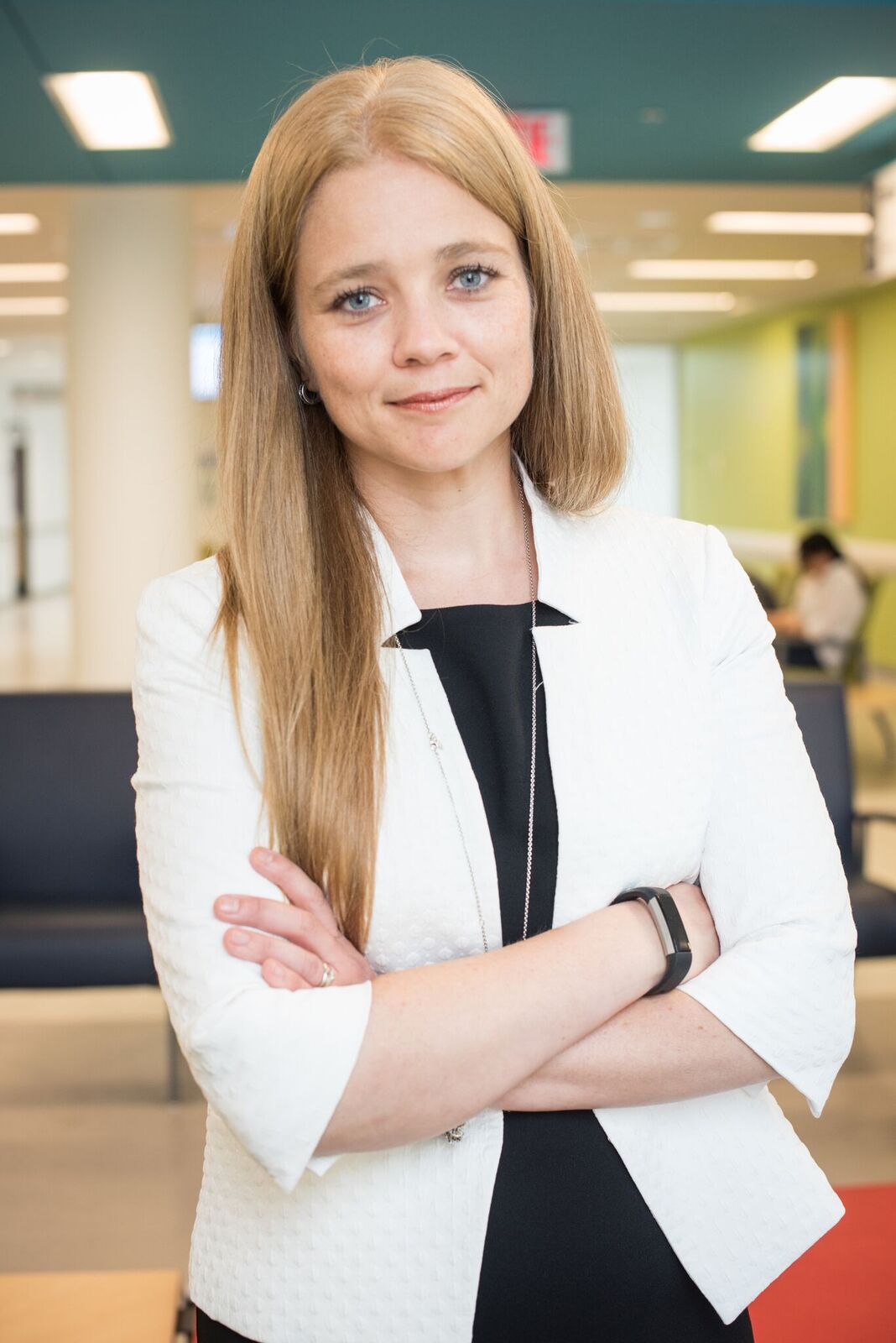RI-MUHC pediatric researcher joins efforts with scientists from the Rady Children’s Institute for Genomic Medicine to discover new mutation

Source: MUHC
Mathilde came into the world with chubby cheeks and a full head of auburn hair. But she was a very sick baby, and was immediately transferred on January 19, 2013 to the Neonatal Intensive Care Unit at the Montreal Children’s Hospital of the McGill University Health Centre (MCH-MUHC). By the time she arrived, she was sicker than initially expected; Mathilde’s small head was of particular concern to doctors. She underwent neurological tests, and sadly, they came back abnormal: her brain hadn’t developed properly and her brain white matter (or myelin) was found to be atypical. Doctors confirmed she was suffering from an unidentified kind of genetic leukoencephalopathy, a family of diseases affecting both the nerve cells and the white matter. Mathilde passed away when she was two-and-a-half months old, surrounded by the people who loved her most.
Thanks to an international effort led by physician-scientists at Rady Children’s Institute for Genomic Medicine (RCIGM)-San Diego in California, Dr. Geneviève Bernard’s team at the Research Institute of the McGill University Health Centre (RI-MUHC) was able to confirm the diagnosis for Mathilde: she died from VARS-related disorder, an extremely rare neurodevelopmental condition. Their findings, which were recently published in Nature Communications, are paving the way for the first step in developing potential therapies for this rare neurodegenerative condition.
Investigators performed advanced genetic tests on blood samples from seven children with neuro-developmental disabilities who were evaluated by doctors in San Diego, Montreal and Cairo. This led to the discovery of mutations in the VARS gene, which had not previously been linked to human disease.
“These children showed epileptic seizures and abnormalities evident on brain MRI scans,” said lead study’s author Joseph Gleeson, MD, director of neurodevelopmental genetics at RCIGM and professor of neuroscience and pediatrics at UC San Diego School of Medicine. “Although no treatment currently exists for this condition, the results are important as the first step in guiding research directed at targeted therapies.”
The genetic mutations identified in the study led to a defect in the enzyme responsible for generating proteins containing the amino acid valine, which is necessary for cellular health. Genetic variations that damage these types of enzymes are associated with a variety of human diseases including microcephaly and neuropathy.
In this study, the team found that enzymatic activity was significantly reduced in cells from their young patients. The findings suggest that children with this disorder may benefit from treatments to support the synthesis of new valine-containing proteins in the brain.
The cause of genetic disabilities in many children is rarely identified. This limits the ability of doctors to develop precise treatment plans. Both whole exome and whole genome testing were conducted as part of this study. These tests search an individual’s genetic code for imperfections that are the source of disease.
 “Trying new approaches to understand these diseases is important. Having an answer about what’s making their child so sick helps families grieve,” added study co-author Geneviève Bernard, MD, MSc, FRCPc, pediatric neurologist and a researcher with the Child Health and Human Development Program of the RI-MUHC.
“Trying new approaches to understand these diseases is important. Having an answer about what’s making their child so sick helps families grieve,” added study co-author Geneviève Bernard, MD, MSc, FRCPc, pediatric neurologist and a researcher with the Child Health and Human Development Program of the RI-MUHC.“The diagnosis gave us some closure,” said Mathilde’s father, Gabriel. Because their daughter’s disease was so rare, they agreed to take part in further research into the disorder. “It felt good to know that our daughter could help other children and the scientific community at large.”
Patient evaluation and testing for this study was conducted at Rady Children’s Hospital-San Diego, the Montreal Children’s Hospital of the McGill University Health Centre and the National Research Center in Cairo. Medical research institutions in Amsterdam, Hong Kong, Qatar and Egypt also played a supporting role in confirming the biologic impact of the mutation in the VARS gene.
“For ultra-rare conditions such as this one, collaboration among multiple research institutions is crucial to confirm that changes identified in the genetic code may be common to multiple children with similar clinical symptoms,” said study co-author Jennifer Friedman, MD, neurologist at Rady Children’s Hospital and professor at UC San Diego School of Medicine.
“Such cooperation and patient matching plays a critical role in the identification of new genes and provision of diagnoses to geographically dispersed individuals with the same rare disorder,” Dr. Friedman added.
In future experiments, the researchers hope to test whether dietary supplementation with valine or gene therapy may help to restore the altered protein in the brain of these children.
About the study
This research was made possible in part by support provided by The McGill University and Génome Québec Innovation and Centre Compute Canada.
This work was partly supported by grants from the Canadian Institutes of Health Research (CIHR), la Fondation du Grand Défi Pierre Lavoie, Fondation les Amis d’Eliott, Fondation Lueur d’Espoir pour Ayden, et le Réseau de Médecine Génétique Appliqué du Fonds de recherche en santé du Québec.
Julie Robert
Communications – Research
McGill University Health Centre
T : 514 934-1934 ext. 71381
C. 514-971-4747
February 27, 2019
